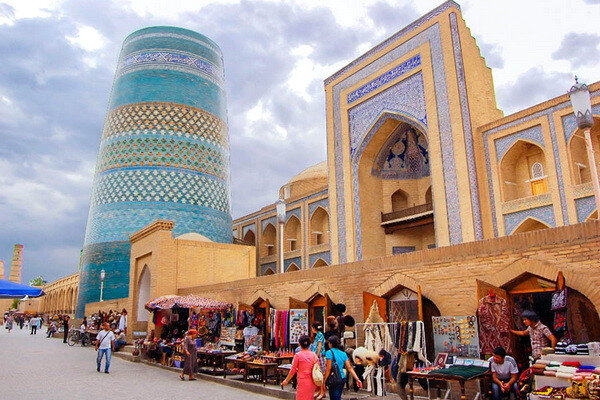Khiva set to dazzle as tourism capital of the Islamic world

UZBEKISTAN, Khiva - Here in Khiva, meticulous preparations are underway as the ancient city readies itself to host the 12th session of the Islamic Conference of Tourism Ministers (ICTM) from May 31 to June 2.
According to organizers, the event, themed "Development of the Tourism Industry in a Sustainable and Resilient Way," is set to not only highlight Khiva but also serve as the inauguration of its year-long celebration as the tourism capital of the Islamic world.
The overall atmosphere of the city is highly associated with excitement and pride. Many streets are adorned with festive decorations to welcome guests that include ministers and dignitaries from the member states of the Organization of Islamic Cooperation.
Welcoming faces of the locals, harmonious blend of ancient traditions with modern amenities along with restaurants serving indigenous cuisine adds to its historical charm.
Here, local artisans are busy crafting traditional handicrafts, while shopkeepers prepare to welcome an influx of international visitors. The sense of community and shared purpose is inspiring.
Meanwhile, local authorities are keenly aware of the importance of this event. They view it not just as an opportunity to showcase Khiva but also as a chance to highlight Uzbekistan’s broader tourism potential.
A must-visit destination for history enthusiasts
One of the most ancient cities in the Khorezm region, Khiva boasts a history that spans over 2,500 years.
Within Khiva lies the walled fortress of Itchan Kala, encapsulating the essence of the city's cultural richness. This citadel harbors over 60 cultural landmarks, including medieval mosques, lavish palaces, and an array of museums, souvenir shops, and artisan workshops.
So, it would not be overstating it to say that Khiva is a living museum, with its well-preserved Itchan Kala, which has been a UNESCO World Heritage site since 1990. Walking through the narrow, cobbled streets of Itchan Kala, surrounded by towering mud-brick walls, feels like stepping back in time.
Spanning approximately 1,500 years, from 130 BC to 1453 CE, this pivotal Central Asian region served as a place for the exchange of not only goods like silks and spices but also a diverse array of ideas and philosophies.
Looking at historical sources, we realize that during the 9th to 12th centuries, the Khorezm region was a beacon of learning and scientific inquiry. The renowned Al-Ma'mun Academy in Khorezm was a center for pioneering work in astronomy, mathematics, medicine, and chemistry.
The region gave rise to illustrious scholars such as Muhammad bin Musa Al-Khwarizmi, known as the Father of Algebra, and Abu Al-Rayhan Al-Biruni, a polymath who made significant contributions to astronomy and philosophy.
Furthermore, Khiva is an architectural gem of the past. It stunning minarets, for instance, captivate the imagination of most visitors, it is where the echoes of history resonate through every alley and courtyard.
Looking ahead
Khiva is not only a testament to Uzbekistan’s rich past but also a symbol of its aspirations for the future. According to a local official, the preparations for the ICTM and the year-long celebrations are deemed as pillars for solidifying the country's place on the global tourism map.
"It is more than just an event; it is a declaration of Khiva’s and Uzbekistan’s commitment to cultural and economic prosperity."
Available evidence suggests the designation of Khiva as the Tourism City (Capital) of the Islamic World for 2024 is expected to have a profound impact on its tourism prospects. The influx of high-profile visitors for the ICTM is anticipated to encorage more tourists to visit Uzbekistan, particularly to Khorezm and Khiva.
A relevant official said: "The increased tourism will undoubtedly contribute to our local economy, creating more jobs and boosting income for residents."
From a wider perspective and aprat from tourism outlooks, in the current politically-motivated world, these close interactions of cultural dialogue are crucial for fostering mutual understanding and appreciation among nations and communities worldwide.
AFM
Leave a Comment